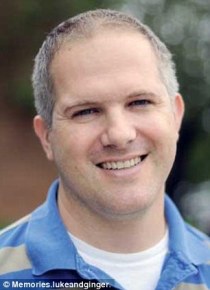 You’ve likely heard the stereotypes about millennials: They’re a generation of entitled misfits. They lack a strong work ethic. They’re only interested in activities that offer immediate gratification.
You’ve likely heard the stereotypes about millennials: They’re a generation of entitled misfits. They lack a strong work ethic. They’re only interested in activities that offer immediate gratification.
You want the truth? This generation isn’t going to wreck the world. They’re going to save it.
If millennials feel entitled to anything, it’s the opportunity to be passionately engaged in a vision they can pour their entire heart and soul into. Show them what success looks like, then get out of the way and watch what awesome looks like.
I’d like to introduce you to Mike Derheim, one of nine millennials I interviewed who have faced and overcome significant obstacles that stood in the way of their goals and dreams. It’s a privilege to share their inspiring life stories with you here.
Click here to see all the Millennials Rising stories.
MIKE DERHEIM

Mike Derheim
Mike Derheim, born in 1978, is cofounder of The Nerdery, a Minneapolis-based custom software design and development company. The Nerdery made Inc. magazine’s list of 5,000 fastest-growing companies for seven years running.
After switching majors three times, I dropped out of North Dakota State College of Science in 1998 to work in tech support at a small, growing company called Minnesota Internet. The owner was a super entrepreneurial, kind of take-over-the-world guy named Tim Davis. I worked for the Internet Service Provider half of the company. The other half did custom software development for legacy systems on old green-screen terminals.
I hit it off with Tim right away and he became my de facto mentor. I rose up the ranks very quickly because I worked so hard and learned so much. Within a year, I was doing system administration and networking. I worked ridiculous hours and really enjoyed it.
My brother, Troy, owned a hot tub, pool and spa company in Fargo and had space for us. I told Tim that our Internet provider model was so awesome that we needed to start a company just like Minnesota Internet in North Dakota. So we did. Troy, Tim and I went in as equal partners.
I spent the next few years working sixty to seventy hours a week at Minnesota Internet. On Friday evening after work, I would get in the car, pick up my live-in girlfriend, Amanda, and drive to North Dakota. I’d spend the weekend doing everything from fixing systems to going door to door trying to sell Internet service.
During that period, I continued to grow at Minnesota Internet and eventually moved to the software side of the company. By 2001, I was the vice president of software development and Internet services. A guy named Mike Schmidt was a project manager there.
We had rebranded Minnesota Internet as Infinitivity and had been on a spree of acquisitions to grow the company. In early 2000, we bought a company called Verity Data Systems that had been founded by Luke Bucklin, a serial entrepreneur. Luke came to work for us as part of the deal, and he, Mike, and I kept pushing the company forward into new technologies. We were a really tight team.
After a year and a half, Luke moved on because he had fulfilled his contract and wanted to do something different. But we kept in touch, and Mike and Luke continued to hang out together quite a bit.
Shock and Stress
In December 2001, Tim and I were working late. Around six o’clock, he said he was taking off. He went home, sat down on the couch, had a heart attack, and died. He had an enlarged heart and his heart just stopped beating. He was forty-two. He had a wife and kids. It was a horrible tragedy.
Tim’s death was really significant for me because he was woven so deeply into my life. We worked very well together and had a lot of respect for each other. He appreciated my ability to solve whatever problem he brought me.
He was also my business partner in North Dakota Internet. He had funded it and had the market knowledge and expertise that I was still learning. Above all those things, he was just a really good friend of mine and someone I looked up to.
Tim was a very imposing leader and had his thumb on absolutely everything that was going on inside that company. So when he passed away, there was an enormous amount of work that had to be done. These companies were not prepared by any stretch of the imagination for Tim to pass away. The responsibility fell on me and the two other company vice presidents to figure out what to do next and to reinforce the perception that the company was going to be okay.
On top of all my other responsibilities, I also had to keep North Dakota Internet going. It was viable but wasn’t doing very well. Just to keep myself from going broke, I had to make sure that was taken of. The only thing that kept me sane through all of this was Amanda. We had gotten married in June 2001, six months before all hell broke loose.
In the wake of Tim’s death, I simply didn’t have the option to grieve. My only option was to just keep pushing forward and figure out how to deal with it on my own. I certainly felt the emotional fallout, but I ignored it as best I could and grieved silently when it threatened to overwhelm me.
Ultimately, Pixius, a company out of Wichita, bought the company from Tim’s widow. It wasn’t an ideal fit. We were a long way away and had different strategies. I worked there for a year and a half and was eventually promoted to be the leader of the Minnesota office, which had fifty or sixty people.
At the same time, I sold North Dakota Internet to Pixius for a dollar. We were a Mom and Pop ISP, which was common then even though industry consolidation had already begun. When Pixius said they would take all the debt and responsibilities off my hands as part of the deal, I jumped on it.
Three Friends and a Startup
In October 2003, just two months into running Pixius, I was craving more fulfilling work. I had always had an entrepreneurial spirit, which surfaced at fifteen when I started a company with a friend selling and installing car speakers. So when Luke and Mike approached me and asked, “What would you think about going out on our own?” I knew it was just the adventure I was looking for.
After a number of brainstorming and planning sessions, we decided our startup would be a custom software company. A day before asking me to join them, Luke and Mike had come up with the name Sierra Bravo Corporation because Sierra and Bravo are part of the phonetic alphabet used by pilots, and the initials of those two words corresponded to their last names: Schmidt and Bucklin. When I joined, they asked what they should do with the name. I just laughed and said it was the last thing I cared about. As it turned out, we would keep that name for seven years before changing it to The Nerdery, which was a better description of who we were and what we did.
The partnership between the three of us was perfect—very symbiotic. Luke was a born leader—inspirational, outgoing, great in sales. Mike was highly technical. My specialty was solving problems. I understood how to build systems around operations to make things predictable and efficient.
Luke was the president—effectively the CEO. I was the senior vice president of operations. Mike was senior vice president of software development. We grew the company quickly and profitably and paid ourselves a pretty good wage. The company grew by double or triple digit percentages year after year.
Disbelief and Devastation

Luke Bucklin
We didn’t actually know for seven days that he was gone. The only thing we knew was that he hadn’t reported in and that the air traffic controllers had lost contact with him on radar. He was flying over Gannett Peak, which is a nearly 14,000-foot peak in Wyoming. It was very rugged terrain and a storm came in right behind him; the snow covered up a lot of the wreckage and made it almost impossible to travel there and search for them. For seven days, nobody knew if they were alive or dead.
The day after his plane had crashed, we were still hopeful. Being a bunch of nerds, we cleared out one of the conference rooms and turned it into mission control. We hung maps up all over the room and bought computer simulator software to simulate his flight path. We tried to pinpoint where he was so we could try to help the rescuers. I’m sure the search-and-rescue team was going crazy because we kept sending them information and calling them. We had a ton of hope that Luke had had to make an emergency landing in the middle of a frozen lake.
When a place crashes, an ELT (Emergency Location Transmitter) is supposed to detect the impact and make radio noise so you can find it with radio direction finding equipment. But the search-and-rescue team told us they couldn’t pick up a signal. A day or two later, they did pick up a signal but it was weak and they couldn’t tell where it was coming from because the mountainous terrain made it echo. Of course, I jumped to the conclusion that Luke must have fixed it, which is crazy but we latched on to any possibility that they could have survived. In retrospect, I think we were the only ones suffering from that delusion.
The rescuers knew that the chances that it wasn’t a catastrophic crash were impossibly small given the weather conditions. Even if Luke had landed the place safely, there was nothing for miles in every direction but mountainous terrain and bears. And it was freezing cold. There was no way they could have survived for any length of time. But we did everything we could think of to convince ourselves otherwise. The first two or three days we were sure everything was going to be okay, but our hopes dwindled after that. When we finally found out that it was over, it was still a shock but at that point we knew it was coming.
Grief Demands Its Due
My role changed the moment we found out that Luke had died. In addition to dealing with all of the anguish, I had to immediately take over the more visible leadership role and be the keeper of the vision, the person everyone looked to for reassurance. I had to stop driving the activities every day that made the company run, which was one of the hardest things of all for me.
The combination of losing my best friend and assuming Luke’s responsibilities of being the primary leader and face of the company was horribly difficult and stressful. It was similar in a lot of ways to what had happened nine years earlier with Tim, only more intense. Luke was even a closer friend than Tim was, and we were closer in age. We had worked very closely together in running the business every day, growing the business, and strategizing about the future.
Fortunately, the three of us had talked about this kind of scenario and had planned accordingly by getting insurance coverage and preparing buy-sell agreements. We had some very loose discussions around what would happen if something happened to one of us, but nobody ever thinks that they’re just going to not be there one day. Certainly because of the situation I went through with Tim, it was a very real possibility to me, perhaps more real than it is to a lot of people. So we were definitely more prepared than a lot of companies our size might be.
Just like in the aftermath of Tim’s death, I didn’t have the option to grieve. I felt a strong sense of duty to make sure everything was taken care of, but it would be disingenuous to say that I was a rock through the entire thing. Honestly, I think I was a bit numb for a while. I don’t think there was a moment when it really hit me other than the day we found out Luke had died.
I leaned on my wife and family and friends to talk things through, although I’m sure they would say I didn’t do that nearly enough. To a large extent, I just internalized it and pushed through because I didn’t have any choice. There wasn’t a lot of time to do anything other than taking care of the priorities of the day. I was pretty depressed for a couple of years. It took a long time for me to feel like I was pulling out of it.
The Making of a Leader
In the years since Luke’s passing, I’ve grown tremendously as a leader. Our responsibilities when we started up were very well defined. Luke’s job was to be the guy who maintained the vision and inspired people to succeed. He was in charge of sales and marketing. He was the one who gave the speeches. My job was to make sure that Luke’s vision turned into reality.
It took a couple years before I stopped feeling like an imposter. For a long while, I felt like I was completely miscast in the leadership role, which to some extent was true. I wasn’t ready. But I was also much more qualified than I thought in the beginning.
I am so much more confident now in myself, in my ability to play whatever role is needed. I’ve learned so much about so many things, like public speaking and how to do that well. I was terrified the first time and now I do it all the time. I didn’t have any training. I just started talking.
When Luke passed away, we were doing $15.9 million in sales, and we had just finished our plan for 2011, which was $30 million. So we were essentially planning to double our size over the course of the next year. After Luke’s death, we evaluated whether or not that was still the right idea, and decided that all the things that made it true before were still true. So we continued down that path. We did $30 million in sales in 2011 and $42 million the year after that.
We’ve continued to grow, which is a testament to the principles that Luke was so passionate about and which I’ve tried to carry on to the best of my ability. He had an amazing belief in people, which I had never really understood until I was thrust into a leadership role. Through our core values, we’ve immortalized Luke in a lot of ways. His spirit is still strong here.
What I learned from Luke is that everybody wants to be inspired. Everybody wants to be excited. Everybody wants to feel like they’re part of something meaningful. Having a healthy, growing company is a direct result of treating people as if they matter, as if their opinion matters, as if the things they do every day matter. That’s the true responsibility of a leader. And I have Luke to thank for that.
ABOUT PHIL BOLSTA

If you feel more stressed than blessed . . . if you have more confusion than clarity about how to live your beliefs . . . if you long to live a richer, happier, more meaningful life . . . you will find a wealth of insight and guidance in Through God’s Eyes: Finding Peace and Purpose in a Troubled World.
Through God’s Eyes is a road map for living a more peaceful, beautiful life. It’s the only book that explains how dozens of spiritual principles interact, how to weave them together into a cohesive worldview, and how to practically apply this spiritual wisdom to daily life.
Readers everywhere are discovering that when you challenge yourself to look through God’s eyes, the world around you changes, and so do you.
Who will benefit from reading Through God’s Eyes?
Anyone who is on a spiritual path, or wants to be.
Anyone who loves life, or wants to learn how to.
Anyone who is happy, or wants to be happier.
Click here to order your copy of Through God’s Eyes from GodsEyesAmazon.com.
For an inscribed copy, click here to e-mail Phil for information.
Click here to visit the Through God’s Eyes website.
Click on the link below to download a FREE 28-page chapter!
SEE EVERY MOMENT AS A GIFT
Click here to read endorsements from authors and thought leaders.
Click here to read unsolicited testimonials from readers.
Click here to ask Phil to add you to his e-mail list for updates on his blog and books.
Here is a two-minute video introduction to Through God’s Eyes.

Like to learn more about Through God’s Eyes? Here is a free 44-page PDF sampler from the book that includes:
• an overview of the book
• the complete table of contents
• the Foreword by Caroline Myss
• my Introduction
• chapter excerpts
• a sample end-of-chapter story
• endorsements from authors and thought leaders
Just click on the link below to download your free PDF sampler!
THROUGH GOD’S EYES PDF SAMPLER

Schedule a Mastery Mentoring phone session with Phil to learn how to apply principles of spiritual living more effortlessly and effectively. Priced affordably! Click here to e-mail Phil for details.

Phil’s eBook, The Logic of Living a Spiritual Life: Supporting a Life of Faith Through Logic and Reason, is now available for 99 cents.
Order it at GodIsLogical.com.
In this eBook, you’ll find answers to questions like:
• What is the cornerstone of a spiritual life, and why?
• What is the secret to liberating yourself from other people’s judgments and expectations?
• How do you reconcile the “free will vs. Divine Will” conundrum?
• Why is there an exception to “Everything happens for a reason”?
Those who worship logic instead of God are only half right. Not only is it logical to believe in God and to live a faith-based life, the existence of a loving, benevolent God that governs all creation is perhaps the only systematic worldview that explains every aspect of life.
 Phil is also the author of Sixty Seconds: One Moment Changes Everything, a collection of 45 inspiring, life-changing stories from prominent authors and thought leaders he interviewed. The roster of storytellers includes Wayne Dyer, Deepak Chopra, Neale Donald Walsch, Caroline Myss, Larry Dossey, Rachel Naomi Remen, Bernie Siegel, Dean Ornish, and Christiane Northrup. Sixty Seconds has been translated into four languages: Italian, German, Spanish, and Portuguese. Reading this book is like spending a few minutes face to face with each of the contributors and listening to their personal stories.
Phil is also the author of Sixty Seconds: One Moment Changes Everything, a collection of 45 inspiring, life-changing stories from prominent authors and thought leaders he interviewed. The roster of storytellers includes Wayne Dyer, Deepak Chopra, Neale Donald Walsch, Caroline Myss, Larry Dossey, Rachel Naomi Remen, Bernie Siegel, Dean Ornish, and Christiane Northrup. Sixty Seconds has been translated into four languages: Italian, German, Spanish, and Portuguese. Reading this book is like spending a few minutes face to face with each of the contributors and listening to their personal stories.
Click here to order Sixty Seconds.
Learn more by visiting the official Sixty Seconds website.
Click here to read unsolicited testimonials from readers.
Here is a three-minute video introduction to Sixty Seconds.
Tags: inspiring, life stories, millennials
Leave a comment